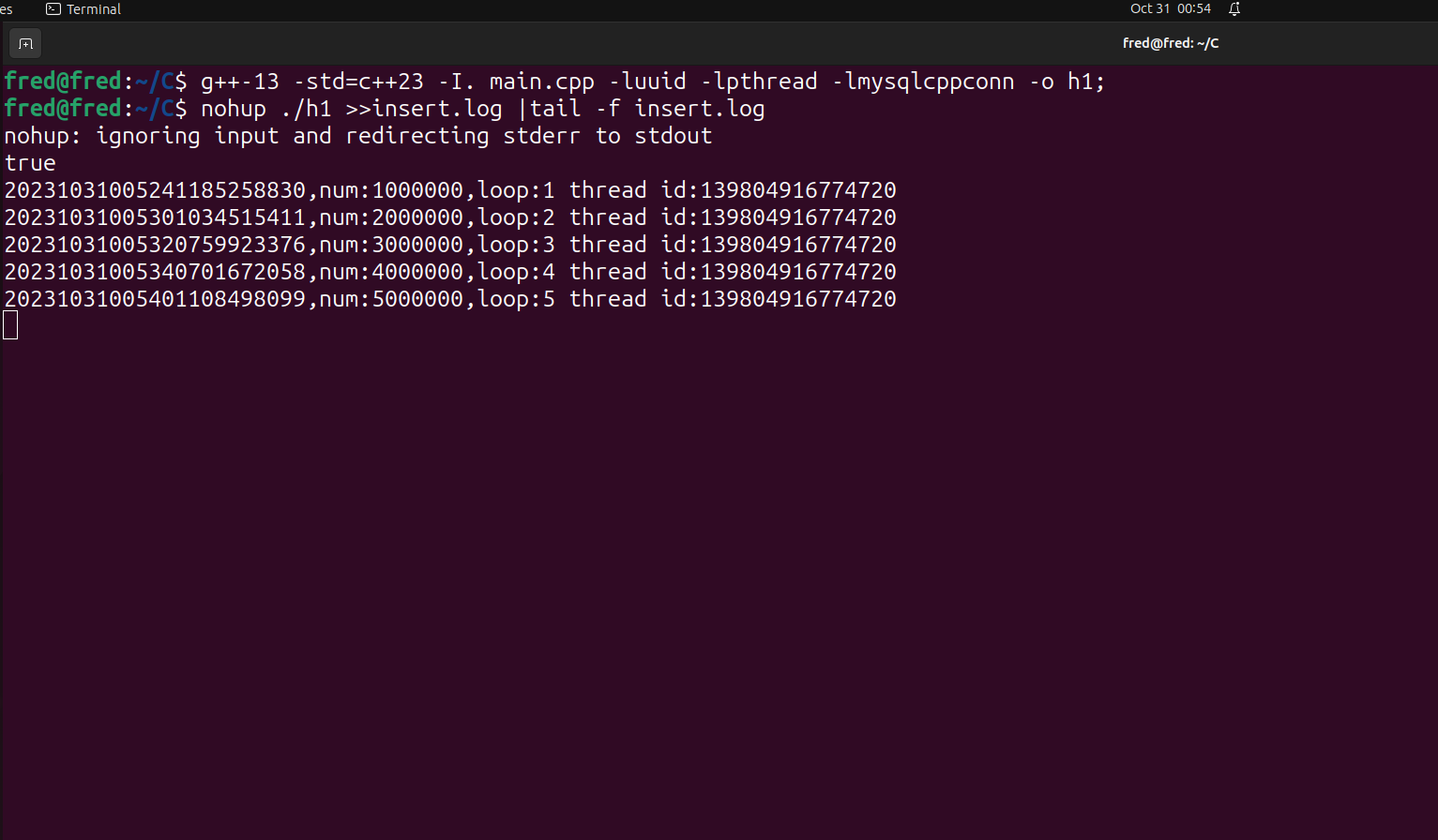//create table t1
CREATE TABLE `t1` (
`id` bigint NOT NULL AUTO_INCREMENT,
`author` varchar(40) NOT NULL,
`comment` varchar(40) NOT NULL,
`content` varchar(40) NOT NULL,
`header` varchar(40) NOT NULL,
`isbn` varchar(40) NOT NULL,
`memory` varchar(40) NOT NULL,
`object` varchar(40) NOT NULL,
`result` varchar(40) NOT NULL,
`summary` varchar(40) NOT NULL,
`title` varchar(40) NOT NULL,
`topic` varchar(40) NOT NULL,
PRIMARY KEY (`id`)
) ENGINE=InnoDB DEFAULT CHARSET=utf8mb4 COLLATE=utf8mb4_0900_ai_ci;
//main.cpp #include <algorithm> #include <chrono> #include <ctime> #include <fstream> #include <iomanip> #include <iostream> #include <map> #include <memory> #include <mutex> #include <pqxx/pqxx> #include <random> #include <set> #include <thread> #include <uuid/uuid.h> #include <vector> #include <cppconn/connection.h> #include <cppconn/driver.h> #include <cppconn/exception.h> #include <cppconn/datatype.h> #include <cppconn/metadata.h> #include <cppconn/parameter_metadata.h> #include <cppconn/prepared_statement.h> #include <cppconn/resultset.h> #include <cppconn/sqlstring.h> template <typename T1, typename T2> void print_mtx_map(const std::map<T1, T2> _mp, const int &interval); std::string get_time_now(bool is_exact = true) { std::chrono::time_point<std::chrono::high_resolution_clock> now = std::chrono::high_resolution_clock::now(); time_t raw_time = std::chrono::high_resolution_clock::to_time_t(now); struct tm tm_info = *localtime(&raw_time); std::stringstream ss; ss << std::put_time(&tm_info, "%Y%m%d%H%M%S"); if (is_exact) { std::chrono::seconds seconds = std::chrono::duration_cast<std::chrono::seconds>(now.time_since_epoch()); std::chrono::milliseconds mills = std::chrono::duration_cast<std::chrono::milliseconds>(now.time_since_epoch()); std::chrono::microseconds micros = std::chrono::duration_cast<std::chrono::microseconds>(now.time_since_epoch()); std::chrono::nanoseconds nanos = std::chrono::duration_cast<std::chrono::nanoseconds>(now.time_since_epoch()); ss << std::setw(3) << std::setfill('0') << (mills.count() - seconds.count() * 1000) << std::setw(3) << std::setfill('0') << (micros.count() - mills.count() * 1000) << std::setw(3) << std::setfill('0') << (nanos.count() - micros.count() * 1000); } return ss.str(); } std::string get_time_span(std::chrono::time_point<std::chrono::high_resolution_clock> _start_time, std::chrono::time_point<std::chrono::high_resolution_clock> _end_time) { std::stringstream ss; ss << std::chrono::duration_cast<std::chrono::seconds>(_end_time - _start_time).count() << " seconds," << std::chrono::duration_cast<std::chrono::milliseconds>(_end_time - _start_time).count() << " mills," << std::chrono::duration_cast<std::chrono::microseconds>(_end_time - _start_time).count() << " micros," << std::chrono::duration_cast<std::chrono::nanoseconds>(_end_time - _start_time).count() << " nanos" << std::endl; return ss.str(); } char uuid_value[37]; uint32_t rand32() { return ((rand() & 0x3) << 30) | ((rand() & 0x7fff) << 15) | (rand() & 0x7fff); } char *gen_uuid4() { int n = snprintf(uuid_value, sizeof(uuid_value), "%08x-%04x-%04x-%04x-%04x%08x", rand32(), // Generates a 32-bit Hex number rand32() & 0xffff, // Generates a 16-bit Hex number ((rand32() & 0x0fff) | 0x4000), // Generates a 16-bit Hex number of the form 4xxx (4 indicates the UUID version) (rand32() & 0x3fff) + 0x8000, // Generates a 16-bit Hex number in the range [0x8000, 0xbfff] rand32() & 0xffff, rand32()); // Generates a 48-bit Hex number // return n >= 0 && n < len; // Success only when snprintf result is a positive number and the provided buffer was large enough. return uuid_value; } void insert_into_mysql_table() { sql::Driver *driver = get_driver_instance(); sql::Connection *conn = driver->connect("localhost", "username_value", "password_value"); conn->setSchema("db"); std::cout << std::boolalpha << conn->isValid() << std::endl; sql::Statement *stmt = conn->createStatement(); std::string sql_str; std::stringstream ss; srand(time(NULL)); std::uint64_t num = 0; for (int loop = 0; loop < 1000; loop++) { ss = std::stringstream(); ss << "insert into t1(author,comment,content,header,isbn,memory,object,result,summary,title,topic) values "; for (int i = 0; i < 1000000; i++) { ss << "('" << gen_uuid4() << "','" << gen_uuid4() << "','" << gen_uuid4() << "','" << gen_uuid4() << "','" << gen_uuid4() << "','" << gen_uuid4() << "','" << gen_uuid4() << "','" << gen_uuid4() << "','" << gen_uuid4() << "','" << gen_uuid4() << "','" << gen_uuid4() << "'),"; ++num; } sql_str = ss.str(); int last_comma_idx = sql_str.find_last_of(","); sql_str = sql_str.substr(0, last_comma_idx); stmt->execute(sql_str); std::cout << get_time_now() << ",num:" << num <<",loop:"<<loop+1<< " thread id:" << std::this_thread::get_id() << std::endl; } conn->close(); std::cout << get_time_now() << ",finished thread id:" << std::this_thread::get_id() << ",line " << __LINE__ << " of " << __FUNCTION__ << std::endl; } int main(int args, char **argv) { insert_into_mysql_table(); std::cout << get_time_now() << ",finished in " << __LINE__ << " of " << __FUNCTION__ << std::endl; }
Compile
g++-13 -std=c++23 -I. main.cpp -luuid -lpthread -lmysqlcppconn -o h1;
Run
nohup ./h1 >>insert.log |tail -f insert.log

show columns from db.t1; select * from t1 order by id desc limit 1;

- lmysqlcppconn and create insert mysqllmysqlcppconn and create insert create insert select mysql lmysqlcppconn procedure mysql call equalize insert and libmysqlcppconn-dev libmysqlcppconn insert mysql create post and po insert select mysql last_insert_id functions insert mysql duplicate insert update mysql insert mysql